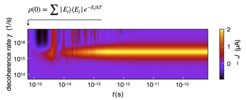Decoherence Effects Break Reciprocity in Matter Transport
The transition between the quantum and classical worlds is intriguing. This transition harbors fundamental questions concerning the appropriate description of quantum decoherence or, analogously, quantum mechanical collapse events and quantum measurements.
We have discovered that this transition regime enables a novel type of matter transport. Applying this discovery, we present nanoscale devices in which decoherence or random quantum jumps produce fundamentally novel phenomena by modifying the propagation of electron wave packets.
Non-centrosymmetric conductors with mesoscopic length scales act as two-terminal rectifiers with unique and completely novel properties (see Fig.1). These devices transport single electrons preferably in one direction and not in the other, much as the famous demon considered by James Maxwell in 1867 was supposed to do.

Preference of electron transmission in forward vs. backward direction of an arrow-shaped conductor, calculated by two theoretical methods. In the quantum world (left side) and in the classical world (right side), the transmission probabilities in forward and backward direction are precisely the same; their difference is zero. Every device known up to now operates in this manner. In the transition zone between the quantum and the classical world (decoherence rate ~1014–1015 /s), however, a distinct peak of unequal transmission develops, revealing that the device transports electrons preferably in forward direction (after Fig. 4 of Ref. 1).
In these devices, the well-known thermal equilibrium occupancy of quantum states of an electron becomes unstable, giving rise to states characterized by charge separation between the two leads, or, in closed circuits, to the generation of persistent currents (see Fig. 2). Amazingly, these persistent currents are supposed to flow even in the presence of processes that push the system back towards equilibrium and thereby model dissipation.
This behavior is a strict prediction resulting from the laws of quantum physics, yet it is not consistent with the laws of thermodynamics. The new dynamics provides an exemption to the reciprocity relation, for which Lars Onsager has been awarded the Nobel prize in 1968, as it forms the foundation of nonequilibrium thermodynamics.
According to the current state of our work, it cannot even be excluded that the described effects violate the second law of thermodynamics, which effectively says that it is not possible to invent a Maxwell demon which continuously generates usable work from a device in thermal equilibrium.

Plot showing color-coded the value of a one-electron persistent current flowing in a quantum ring at finite temperature. The x-axis gives the time, the y-axis the degree of decoherence. The quantum world is at the bottom, the classical world at the top. At the start of the calculation, the electron is in thermal equilibrium — no current is circulating. The thermal equilibrium has to be stable and it is found to be stable in the classical and in the pure quantum world. However, in the transition regime between both the thermal equilibrium evolves into a novel steady state. In this state, a ~2 μA current circulates persistently in the ring (after Fig. 7 of Ref. 1). These currents, circulating in mesoscopic devices, in molecules, or in crystals, generate a novel kind of magnetism.
This work has been published by Philipp Bredol et al. in Phys. Rev. B 104, 115413 (2021).

